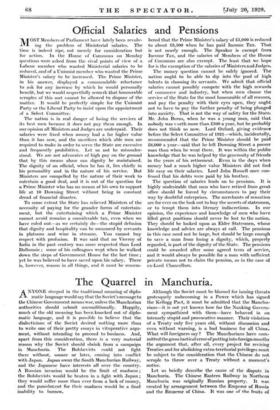Official Salaries and Pensions M OST Members of Parliament have lately
been revolv- ing the problem of Ministerial salaries. The time is indeed ripe, not merely for consideration but for action. In the House of Commons on Monday questions were asked from the rival points of view of a Labour member who wanted Ministerial salaries to be reduced, and of a Unionist member who wanted the Prime Minister's salary to be increased. The Prime Minister, in his answer, displayed a commendable reluctance to ask for any increase by which he would personally benefit, but we would respectfully remark that honourable scruples of this sort cannot be allowed to dispose of the matter. It would be perfectly simple for the. Unionist Party or the Liberal Party to insist upon the appointment of a Select Committee.
The nation is in real danger of losing the services of its best men because it does not pay them enough. In our opinion all Ministers and Judges are underpaid. Their salaries were fixed when money had a far higher value than . it has now, and the sacrifices which able men are required to make in older to serve the State are excessive and frequently prohibitive.. Let us not be misunder- stood. We are not advocates of high pay on the ground that by this means alone can dignity be maintained. The dignity of an official, when he has it, lies chiefly in his personality and in the nature of his service. But Ministers are compelled by the nature of their work to entertain a good deal, and it is out of the question for a Prime Minister who has no means of his own to support life at 10 Downing Street without being in constant dread of financial disaster.
To some extent the State has relieved Ministers of the necessity of paying for the grander forms of entertain- ment, but the entertaining which a Prime Minister cannot avoid remains a considerable tax, even when we have ruled out—as we certainly do—the stupid delusion that dignity and hospitality can be measured by servants in platoons and wine in streams. You cannot buy respect with profusion. It was said that no Viceroy of India in the past century was more respected than Lord Dalhousie ; some of his colleagues wept when he walked down the steps of Government House for the last time ; yet he was believed to have saved upon his salary. There is, however, reason in all things, and it must be remem- tiered that the Prime Minister's salary of £5,000 is reduced to about £3,500 when he has paid Income Tax. That is not nearly enough. The Speaker is exempt from Income Tax, and the salaries of Members of the House of Commons are also exempt. The least that we hope for is the exemption of the salaries of Ministers and Judges.
The money question cannot be safely ignored. The nation ought to be able to dip into the pool of high talents in choosing its servants. We admit that official salaries cannot possibly compete with the high rewards of commerce and industry, but when men choose the service of the State for the most honourable of all reasons, and pay the penalty with their eyes open, they ought not to have to pay the further penalty of being plunged into anxiety. That is not the way of safety for the State: Mr. John Burns, when he was a young man, said that nobody was v:orth more than £500 a year, but he probably does not think so now. Lord Oxford, giving evidence before the Select Committee of 1921—which, incidentally, recommended that the Prime Minister should be paid £8,000 a year—said that he left Downing Street a poorer man than when he went there, It was within the public knowledge that he was helped by the generosity of friends in the years of his retirement. Even in the days when money had a much higher value Ministers did not find life easy on their salaries. Lord John Russell once con- fessed that his debts were paid by his brother.
The question of salaries leads on to pensions. It is highly undesirable that men who have retired from great office should be forced by circumstances to pay their way by doubtful enterprises. The merchants of sensation are for ever on the look out to buy the secrets of statesmen, or to tempt them into literary indiscretions. In our opinion, the experience and knowledge of men who have filled great positions should never be lost to the nation. They should be looked upon as Elder Statesmen, whose knowledge and advice are always at call. The pensions in this case need not be large, but should be large enough to save a man from losing a dignity, which, properly regarded, is part of the dignity of the State. The pensions could be awarded after some agreed term of service, and it would always be possible for a man with sufficient private means not to claim the pension, as in the case of ex-Lord Chancellors.
















































 Previous page
Previous page